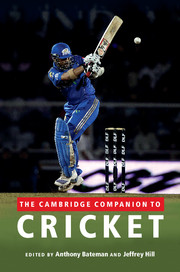Book contents
- Frontmatter
- Introduction
- 1 Cricket pastoral and Englishness
- 2 Cricket in the eighteenth century
- 3 Corruption in cricket
- 4 Broadcasting and cricket in England
- 5 Bodyline, Jardine and masculinity
- 6 Don Bradman: just a boy from Bowral
- 7 The Packer cricket war
- 8 New Zealand cricket and the colonial relationship
- 9 C. L. R. James and cricket
- 10 Reading Brian Lara and the traditions of Caribbean cricket poetry
- 11 The detachment of West Indies cricket from the nationalist scaffold
- 12 The Indian Premier League and world cricket
- 13 Hero, celebrity and icon: Sachin Tendulkar and Indian public culture
- 14 Conflicting loyalties: nationalism and religion in India–Pakistan cricket relations
- 15 Cricket and representations of beauty: Newlands Cricket Ground and the roots of apartheid in South African cricket
- 16 Writing the modern game
- 17 Cricket and international politics
- Further reading
- Index
5 - Bodyline, Jardine and masculinity
Published online by Cambridge University Press: 28 September 2012
- Frontmatter
- Introduction
- 1 Cricket pastoral and Englishness
- 2 Cricket in the eighteenth century
- 3 Corruption in cricket
- 4 Broadcasting and cricket in England
- 5 Bodyline, Jardine and masculinity
- 6 Don Bradman: just a boy from Bowral
- 7 The Packer cricket war
- 8 New Zealand cricket and the colonial relationship
- 9 C. L. R. James and cricket
- 10 Reading Brian Lara and the traditions of Caribbean cricket poetry
- 11 The detachment of West Indies cricket from the nationalist scaffold
- 12 The Indian Premier League and world cricket
- 13 Hero, celebrity and icon: Sachin Tendulkar and Indian public culture
- 14 Conflicting loyalties: nationalism and religion in India–Pakistan cricket relations
- 15 Cricket and representations of beauty: Newlands Cricket Ground and the roots of apartheid in South African cricket
- 16 Writing the modern game
- 17 Cricket and international politics
- Further reading
- Index
Summary
Douglas Robert Jardine was born to Scottish parents in the exclusive Malabar Hill section of Bombay in October 1900. In retrospect, his birth came arguably at the absolute apex of the British Empire. Bloemfontein, Johannesburg and Pretoria had all recently been captured, and the war in South Africa was (erroneously) thought to be won. The aged Queen still sat comfortably on her throne and oversaw an empire upon which the sun famously never set. The viceregality of Lord Curzon was less than a year old and gave no sign of diminishing prospects for the Raj. Even far off in the Antipodes, the upcoming federation of the six colonies into the Commonwealth of Australia on the first day of the new century seemed to be more a culmination of the promise of empire than a harbinger of its dissolution. In short, Malcolm and Allison Jardine welcomed their only son into a predictable, stable world in which any person in their position could feel confident about the future, secure in the knowledge that British values had shown themselves to be the basis for civilisation as proven by a great empire. In keeping with the tradition of the time, young Douglas was sent back to Britain at the age of nine to be educated. He attended Horris Hill Preparatory School and Winchester before going up to Oxford in 1919, where his cricketing prowess outshone his academic performance. Although he quickly earned his blue as a freshman, he finished with only a fourth-class degree in modern history.
- Type
- Chapter
- Information
- The Cambridge Companion to Cricket , pp. 70 - 84Publisher: Cambridge University PressPrint publication year: 2011
- 1
- Cited by



